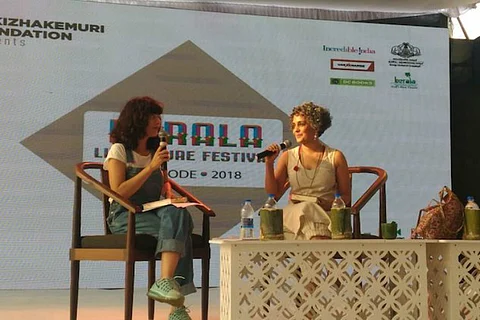

Raising alarm bells again about the critical situation prevailing in the country, writer Arundhati Roy has said that we are living in a dangerous time.
Speaking at a press meet in Kozhikode on Thursday during the Kerala Literature Festival, she said, “This time was going to come, we were going to live through that, but at the same time it should be over soon. What we need to fear more than fundamentalism is cretinism. Cretinism is the child of facism. Stupid text books are being taught at schools. Our children and grandchildren are being taught by morons,” she said.
She said she doesn’t believe that those who dissent or those who resist the fundamentalist tendencies are a minority. “I won’t say we are a minority at all, but slowly people are being terrorised. We are living in a time when millions of people are terrorised, unable to come out of their homes. And so we do have to see how we can spread not just the word, but courage. I believe that in the country today, people have understood that they are being taken for a big ride, a very big ride. At the same time, we have communalism injecting in our veins, poisoning the blood,” she said.
She also expressed her apprehensions on the danger of important resources being handled by a few. “Look at what happened at Narmada. The water in the river used to serve a huge community. Now it’s being collected in a reservoir and given to the rich, given to five star hotels, gold houses. That is the water policy - we will take the water and we will decide how to distribute it. The same thing happened with business. Small businesses are out with demonisation and GST; big businesses are ruling now. They also own the media, they own the mines, they own 3G and 4G, they also own the phone network and the petrochemicals,” she said.
About the shutting down of spaces like Jantar Mantar in Delhi, where people used to protest for various causes, she said, “Of course, sometimes we have to really show some courage, especially now and try to open up those spaces that are being been closed down. Because if we don’t, more and more things will close down. If you see what is happening today, you know everything. I mean capital is in the hands of a few people, water is in the hands of fewer and fewer people, information in the hands of fewer and fewer people, we are going to become a total surveillance state by the time Aadhaar comes.”
“So we need to understand, it’s not just the police, the army or the bullets and with the killings, that authoritarianism is tightening its grip, it’s also with things like Aadhaar. It’ also with laws that are being passed every day, taking away the rights of workers, dismantling all kind of spaces. There are hundreds and thousands who are in jails today in places like Jharkhand and Chattisgarh, people who don’t have names, who don’t have lawyers, who don’t even know why they are in jails. Land is in the hands of a few, money is in the hands of a few and once that happened, those people have increased power,” she said.
Earlier in the day, she was in conversation with Divya Dwivedi on her book The Ministry of Unhappiness.
The session began with Arundhati reading some passages from her book.
"I am a gathering of everyone, but no one, I am not Anjum, I am Anjuman. How to tell a shattered story, by slowly becoming everybody.”
"I am so happy to be here, place I think as a home, and I am for upholding the idea of standing for dispensation as we have never seen before," she said.
She started her conversation on the book by quoting Pablo Neruda, "In which language does rain fall on tormented cities.”
"Jantar Mantar has been shut down as a centre of protest. It is a place which has seen many protests over the years like the Narmada protest, the Bhopal protest. I used to spend a lot of time there. I didn't know what to do with it when it was shut down. It has been shut down and now people have to hire Ramleela maidan, to pay minimum Rs 15,000 to stage protest," she cited.
'"I was thinking of a novel in a city where you can't drive down, where every one has a name and we can't walk past anyone, where you can stop and smoke a cigarette,” she said.
Arundhati said that she is someone who militates against domestication. I had constant pressure to write “The God of Small Things or uncle of it", she chuckled.
She further said, "Radical understanding comes when you connect caste and gender, Kashmir, radicalisation... How can you try something which is defeating these categories?”
Speaking about one of the characters in her book, she said Anjum in the novel is on the border of gender, she is a hijra, but that is not her sole identity, she is a Shia Muslim. She gets caught up in the Gujarat riot but escapes simply because she is a hijra. Then she returns to Delhi and moves to a graveyard to start living as a host.
She received much applause from the audience for her book.